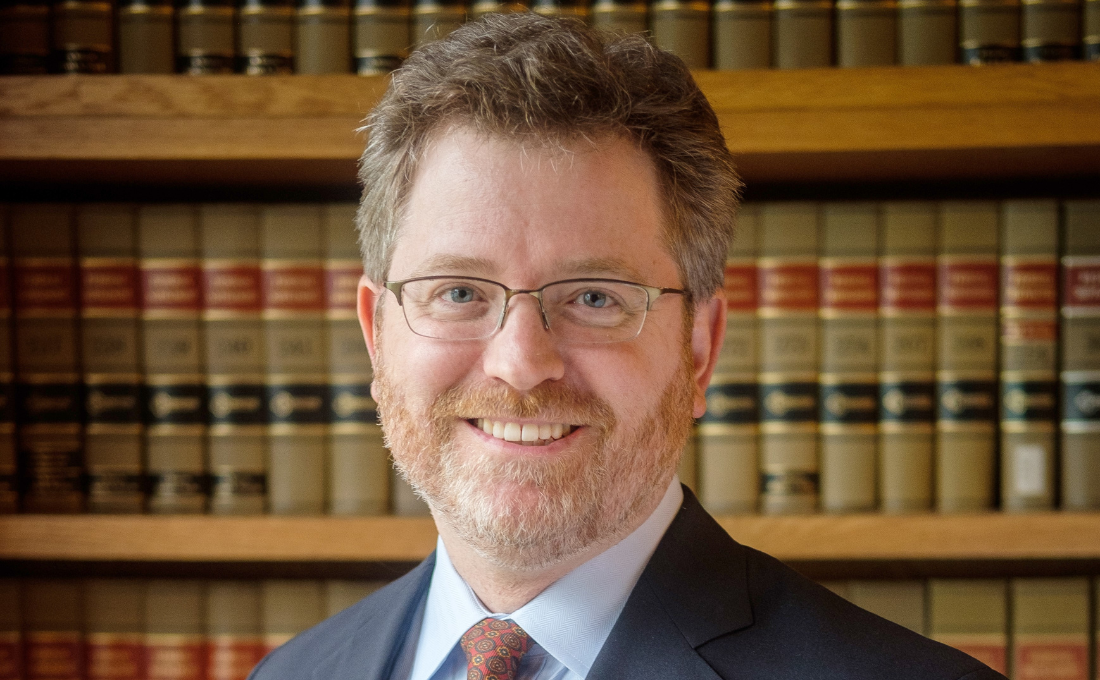Adam Kolber Named Robert Kaufman ’57 Professor of Law

For more than two decades, Professor Adam Kolber has explored groundbreaking issues of bioethics, health law, criminal law, and neurolaw in his prolific and highly esteemed scholarship. He is the creator of the first law school course devoted to neuroscience and the law, as well as the Neuroethics & Law Blog, which in February 2025 celebrated its 20th anniversary. A member of the Brooklyn Law School faculty since 2010, Kolber has now been named the inaugural Robert Kaufman ’57 Professor of Law, an endowed professorship made possible by the late alumnus and longtime Board of Trustees member Kaufman through his generous legacy gift.
In a Q&A, Kolber discusses the issues that have ignited his deep dive into neuroscience and the law, and how, sometimes, the most intriguing research begins with thinking that draws outside the lines.
What is the significance to you of being named the Robert Kaufman ’57 Professor, in light of Kaufman’s legacy in health law and public policy?
It is always an honor to receive an endowed professorship, but it’s a special honor to receive one named after someone who survived the Holocaust, graduated first in his law school class, and went on to become a leader in New York’s legal and philanthropic worlds.
I hope and believe that Bob Kaufman would be proud to see the deep questions we are asking at Brooklyn Law School about what it means to be human in light of new technologies and about how we can run a criminal legal system that promotes public safety and is humane at the same time.
What does the professorship mean to you as a scholar?
When I received the news about the Kaufman professorship, I was really touched. As scholars, we put our work out into the world, not always sure how it will be received. An endowed professorship reflects the school and the Dean’s ongoing confidence in the importance of our work as researchers, teachers, and members of the academic community who care deeply about the future of our world. That is very meaningful to me.
Your latest book, Punishment for the Greater Good, examines the contrasting criminal law theories of retributivism and consequentialism. Is your current research continuing in that area?
One of the most influential ideas in the book is that we pay insufficient attention to the ways in which punishment is experienced. Two defendants may receive the same term of incarceration where one can barely function in prison while the other manages to make friends and develop useful skills. Are they really punished equally? The issue has important implications for what it means to punish people proportionally, especially as neuroscience is now at a stage where we can make more precise inferences about what other people are experiencing.
In my current research, I look beyond criminal law to see how differences in experience should affect the way we think in tort law, tax law, constitutional law and more.
Your Neuroethics & Law Blog has for 20 years been an interdisciplinary forum for legal and ethical issues related to the brain and cognition. What are some issues in the field that you and fellow scholars feel are most relevant now, especially as related to sentencing and incarceration?
If my fellow scholars find an issue relevant, chances are my own attention is elsewhere. My scholarship has a history of focusing on topics fellow scholars don’t yet realize are relevant. I’ve often sought to make proposals that seem surprising at first, but then, on closer appearance, warrant careful intellectual engagement. For example, I’m currently writing a paper about what I call Alice-in-Wonderland sentencing. The Queen of Hearts famously said that we should sentence a defendant first and have the trial afterwards. While, of course, it would be crazy to punish someone before being deemed guilty, it would be a great service to defendants if they knew more about their criminal liability before trial so that they could make more informed decisions about whether or not to plead guilty. Currently, attorneys can estimate the range of punishments a defendant is likely to receive, but that range could be significantly smaller with provisional feedback from an actual judge. My proposal would help defendants make better-informed decisions about whether or not to plead guilty. Though we started with an absurd premise, I think this outside-the-box proposal can be turned into a genuine research question.